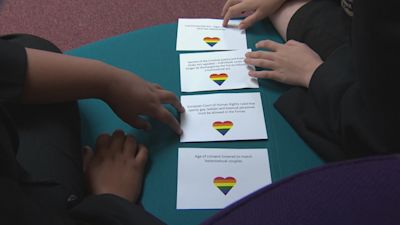School Diversity Week: Eliminating homophobia and transphobia in the classroom

Video report by ITV News' Nick Smith
The head of an LGBT+ charity in Sussex says good support networks in schools for young people questioning their gender or sexuality will help reduce mental health issues in later life.
This week is 'School Diversity Week', with thousands of pupils in the region taking part in efforts to eliminate instances of homophobia or transphobia in the classroom.
School days can be a hugely rewarding experience, but they are also an anxious time when we are still figuring out who we are.
For adults now identifying as LGBT+, looking back, it can generate some painful memories.
Jacob Bayliss from Portslade in West Sussex now helps run an LGBT+ charity.
He is now in his late 20s, but looking back at his time in school he says it was a struggle to confide in teachers.
Jacob said: "I experienced both negative attitudes from both staff and students. There was a lot of bullying.
"I put posters up around my school saying things like 'it's okay to be gay' and I was suspended for that.
"There was no conversation about support. That's something I still carry with me now and I think my experiences at school really impacted my mental health and wellbeing as a young person."
Among the current generation of youngsters, there are much bigger efforts to stamp out instances of homophobia and transphobia.
School Diversity week is now in its forth year and those taking part are encouraged discuss LGBT+ issues and to offer support to other pupils who may be exploring sexuality or gender identities.
Despite far more openness in schools in recent years, Young people who are LGBT+ are still more than twice as likely to experience mental health problems compared the the general population.
But those behind School Diversity Week say continued efforts to support them could see that disparity eliminated.
Dominic Arnall, Chief Executive of Just Like Us, said: "There is nothing about being LGBT+ that should inherently give you a mental health problem. And that mental health problems come from the way LGBT+ people are treated in our society.
"When you look at LGBT+ young people who have been supported at school, their rates of poor mental health drop to about the same as non-LGBT+ people."
Schools have come a long way in the last two decades in celebrating diversity and supporting others who may identify as LGBT+
And if these efforts continue - future generations may find the journey to adulthood that little bit easier than those who went before them.
Useful links and information:
Galop - the LGBT+ anti-violence charity
MindOut - Lesbian, Gay, Bisexual, Trans & Queer Mental Health Service
Mermaids - helping gender-diverse kids, young people and their families since 1995
Stonewall - standing for lesbian, gay, bi, trans, queer, questioning and ace (LGBTQ+) people everywhere
Switchboard - Switchboard is the second-oldest LGBT+ telephone helpline in the United Kingdom